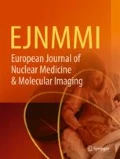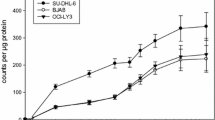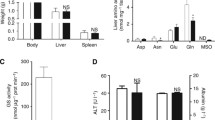Abstract.
The relation between tumour metabolism and induction of apoptosis by gene therapy was investigated in a rat Morris hepatoma (MH3924A) model expressing the HSV thymidine kinase (HSVtk) gene. In vivo the amount of glucose transporter (GLUT1 and GLUT3 isoforms) expressing cells was determined in tumours of untreated and treated animals using immunohistochemistry. In vitro uptake studies with 2-fluoro-2-deoxy-D-glucose (FDG), 3-O-methylglucose and thymidine (TdR) and a TUNEL (TdT-mediated dUTP nick end labelling) assay for the assessment of apoptosis were done immediately and 24 h after treatment of the recombinant cells with different doses of ganciclovir (GCV). Immunohistochemistry revealed a significant increase in GLUT1 in treated tumours which showed enhanced transport activity for FDG. In vitro the FDG and 3-O-methylglucose uptake increased to 186% when compared with that of the non-treated cells immediately after incubation with GCV. However, 24 h later the FDG uptake had declined to its normal level, whereas the accumulation of 3-O-methylglucose remained elevated. The uptake of TdR, which was determined simultaneously, decreased in the acid-insoluble fraction of the cells to 27% and 11%, respectively, immediately and 24 h after therapy, while in the acid-soluble fraction it increased to 229% and to 167%, respectively. Employing the TUNEL technique, 25% of cells were found to be apoptotic 24 h after the termination of GCV treatment. Inhibition of glucose transport by cytochalasin B or competition with deoxyglucose resulted in a 78% (cytochalasin B) and 88% (deoxyglucose) decrease in FDG uptake in the recombinant hepatoma cells and in an increase in the apoptotic cell fraction. It is concluded that inhibition of enhanced glucose transport in GCV-treated cells increased apoptosis. Therefore, enhanced glucose transport seems to represent a stress reaction of tumour cells dedicated for the prevention of cell death.
Similar content being viewed by others
Author information
Authors and Affiliations
Additional information
Received 10 April and in revised form 16 August 2001
Electronic Publication
Rights and permissions
About this article
Cite this article
Haberkorn, U., Altmann, A., Kamencic, H. et al. Glucose transport and apoptosis after gene therapy with HSV thymidine kinase. Eur J Nucl Med 28, 1690–1696 (2001). https://doi.org/10.1007/s002590100644
Published:
Issue Date:
DOI: https://doi.org/10.1007/s002590100644




